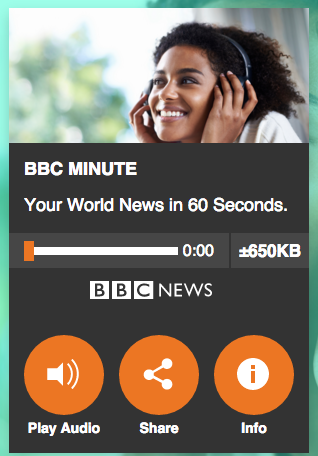The BBC is focusing heavily on expansion in Africa, where the great majority of its traffic come from mobile phones. The BBC World Service and BBC’s digital team Connected Studio ran two hackathons earlier this year, in Cape Town, and Nairobi, and is now starting to launch the winning projects.
 First up is BBC Minute CatchUP, a widget that can be embedded into any webpage to serve up BBC Minute, a 60-second summary of world news. The BBC World Service hopes to reach younger audiences on mobile phones by providing “a channel for quick consumption of the latest news.” The project was developed at the Cape Town hackathon by RLabs.
First up is BBC Minute CatchUP, a widget that can be embedded into any webpage to serve up BBC Minute, a 60-second summary of world news. The BBC World Service hopes to reach younger audiences on mobile phones by providing “a channel for quick consumption of the latest news.” The project was developed at the Cape Town hackathon by RLabs.
Next up will be BBC Drop, a responsive site that offers tailored content on smartphones. Drop was developed at the Nairobi hackathon by Kenyan startup Ongair.
The BBC launched an improved African edition of BBC.com in January. “It was important to land the message that Africans now have a tailored version of our homepage, the way North Americans or Asians have,” Dmitry Shishkin, digital development editor for the BBC World Service, told me. (As of June, African unique visitors to the site were up by 10 percent.) March saw the introduction of Africa Live, a page updated daily with contributions from BBC contributors.“In order to innovate relevantly for audiences outside of the developed world, we should be going to the markets we’re trying to grow our presence in and collaborating with those who know them intimately,” Shishkin said. The BBC is currently reaching about 100 million people in Africa, but “we should be doing better.”
Leave a comment